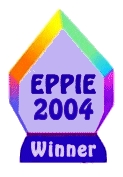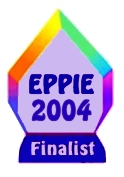Ethical Fiction
Information and links to Ethical fiction resources supplied by Rick Sutcliffe's Arjay Enterprises.
Ethical fiction (EF) deals with issues of right and wrong, not in theory, but as they are applied in life's situations. Ethical fiction must also treat the "why" of ethics, for ideas of right and wrong do not arise from nowhere. Neither do they come about simply by majority opinion. (If that were the case, there would be no basis on which to charge war criminals.)
That said, different people sometimes come to varying conclusions about what is ethical and what is not. Why this is so is a matter for a longer discussion (see the text on this site), but suffice it to say in short that ethics involves the practical application of one's moral theory. That is, one begins with a set of presuppositions about the origin, meaning, and content of right and wrong (morality), and only then applies all this to real situations (ethics). Now, on the one hand, if there is a universal source of morality (and Christians, for instance, believe there is) then ethical decisions will be more or less uniform in the majority of cases. Where two norms conflict, choose the greatest good (and there'll still be agreement if the ranking system is also based on universal absolutes.) On the other hand, if systems of moral thought are arbitrary, whether by dictate or consensus, then no one set of ethical norms can be better than any other, except by general agreement. The latter is easily changed, either by force of persuasion, or by physical force when available. The strongest arguments (whatever makes them that) become the arbiters of right and wrong.
Thus, for instance, those who hold protection of the environment to be the highest value might make ethical decisions that contradict those who hold profit is the highest value. One might say life is the highest value, but how can she assert that value over another who says death is better? Lacking some universally authoritative voice, there is no means to decide what constitutes "good", nor indeed is there a way to define the word. There is no absolute standard by which to measure.
The Bible presents Almighty God, creator of all material things and time itself, as the definer of good. By right of creation, all else is accountable to him. Because human beings fell into sin, death and sicknness were introduced, creation itself became flawed, and apart from God's grace and redemptive activity all humankind would have been lost from God's presense forever. He did send Jesus Christ to deal with this problem, but this created the greatest choice of all: to believe in him and be empowered to follow God's moral code, or to scorn his salvation and live this life by some other set of presuppositions.
So if the effects of moral decisions for one's eternity were not substantial enough, the advent of high technology in this present life, though it neither makes decisions easier or harder, it does invest them with greater urgency (things go wrong faster) and with broader and more substantial consequences.
Rick Sutcliffe's Christian ethical fiction uses alternate history scenarios to highlight ethical decision making in a technological context. Characters wrestle with sin, salvation, the problems of pain, evil, and war. Some are Christians (and use Christian ethics), some are hardened sinners, others are ambiguous, at various levels of interest or maturity, or still on a spiritual journey. They learn and grow--some toward God, some away.
At the same time, science and technology are an integral part of the scene and plot. Decisions and their consequences revolve around issues related to information science, biotechnology, management science, appropriate technology, and medical techniques. On Ortho Earth (Greater Hibernia), past experiences with the horrors of technological warfare have led to a ban on certain technologies, such as projectile, nuclear, and biological weapons. But fallen humans being who they are, some cheat, and moreover the protagonists are Irish so...
The first series, The Interregnum, takes place largely on Ortho Earth, also called Greater Hibernia, and covers the period 1941-2001, during which there was a ban on the throne and the High King's family, and a corrupt oligarchy of nobles ruled.
Volume I, The Peace, published as an electronic book, won an award nomination, was a best seller with its first publisher and received very positive reviews, particularly from Analog magazine's Tom Easton. It was republished by Writers Exchange ePublishing in December 2002.
Volume II, The Friends, is also available in electronic book form and in paper from Booksurge. It was published by Writers Exchange ePublishing in June 2003 and was named the best Science Fiction novel of the year with an EPPIE 2004 award.
Volume III, The Exile was published by Writers Exchange ePublishing in July 2003, and was an EPPIE 2004 finalist for Science Fiction. It is available in both electronic book and paper form.
Volume IV, The General, was published by Writers Exchange ePublishing in March 2006 and is available from them and their retailers in a variety of formats.
Volume V, The Nexus, was published by Writers Exchange ePublishing in April 2006 and is available from them and their retailers in a variety of formats.
Volume VI, The Builder, was published by Writers Exchange ePublishing in March 2012.
The second series, The Throne, takes place almost entirely on Ortho Earth, also called Greater Hibernia, and covers the period 1000-2001 and the kings and queens of Hibernia during that time.
Book 1, Culmanic Parts, contains a memoir of Catherine the great, first High Queen from 1014, the story of the thirteenth century culmanics who began Hibernia's scientific and technological revolution, and the first part of Amy Rea's fourteenth century story.
Book 2, Rea's Blood or Navy Girl or follows Amy Rea through to the battle of Trafalgar in 1440. Expected in November 2015
Book 3, Tara's Mother concludes the story of the war with Spain in 1441 and the peace that follows. Expected in January 2016
Book 4, The Paladin tells the story of Hibernia's throne from 1492 through 2001, concluding both series. Finished; Awaiting second poof reading.
All of Rick Sutcliffe's books can be purchased via links here and of course from the Publisher and other fine retailers in many formats..

|

|
|
The Friends
|
The Exile
|
|

